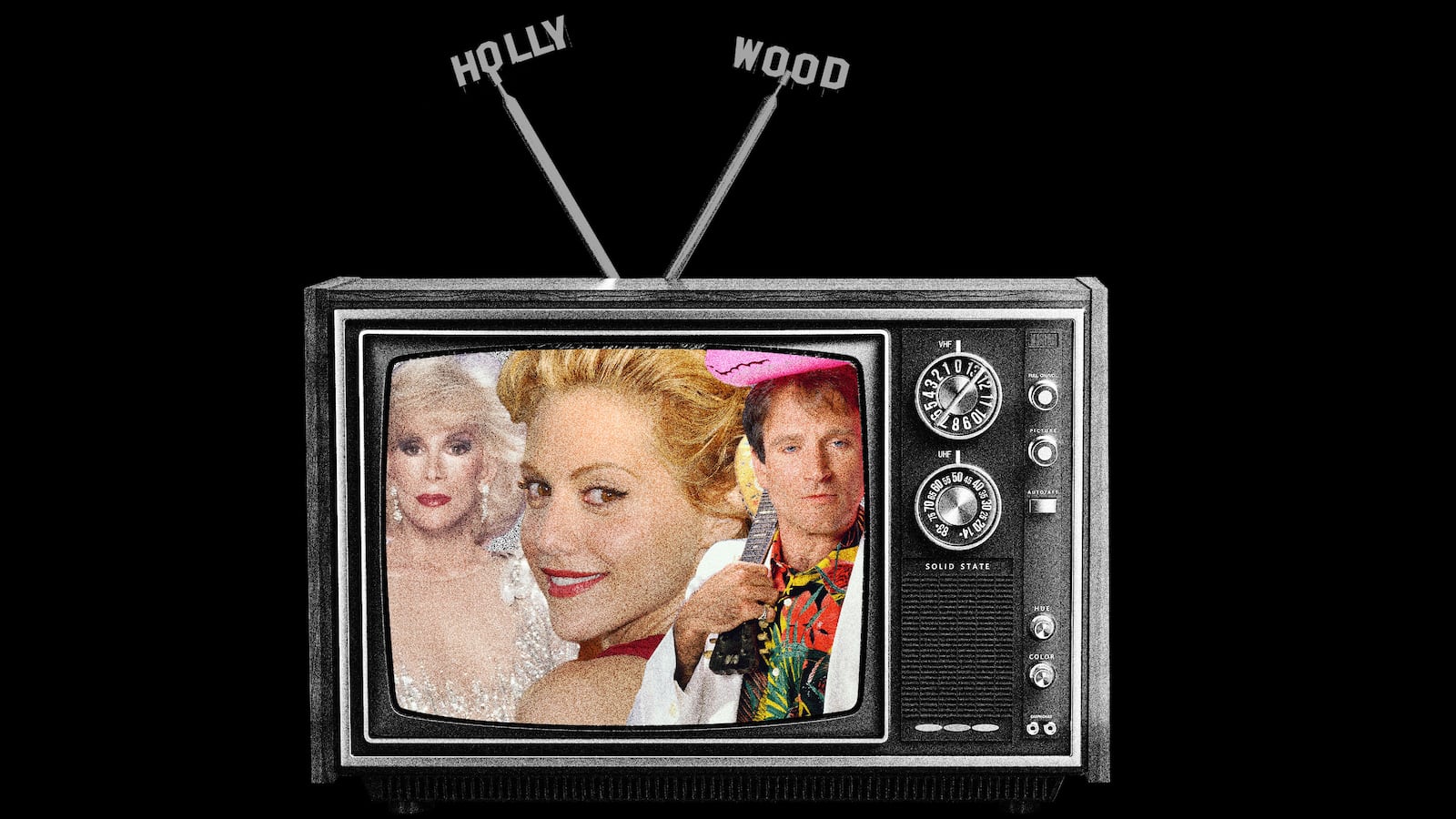A limited series about Joan Rivers has stirred controversy once again. When news first broke of the project last month, discussion emerged about casting Kathryn Hahn, who is not Jewish, to play the legendary comedian. Now the project has been canceled, Variety reports, after its producers failed to secure its subject’s life rights, held by Rivers’ daughter Melissa.
Lifetime’s vast selection of unauthorized biographies demonstrates that one does not necessarily need permission from one’s subject to go forward with a production. But as Variety points out, Joan Rivers’ jokes and catchphrases—recognizable markers of her brand as a comedian—would have been off the table without her life rights. And that’s putting aside the possibility of getting sued.
It’s unclear what stage of production The Comeback Girl reached before someone pulled the plug, but they got at least as far as the logline: “Trailblazer. Adored. Cruel. Diva. Joan Rivers had a life like no other. At age 54, she was a superstar comedienne… and then it all fell apart. THE COMEBACK GIRL is the awe-inspiring untold story of how Joan Rivers persevered through near suicide and professional abyss to rebuild herself and her career to become a global icon.”
The project would have taken place after her late-night talk show’s cancellation at Fox, the same period of time when her husband Edgar Rosenberg killed himself. Reporter Kate Aurthur says the production never involved Rivers’ daughter or estate.
Reading about The Comeback Girl made me think of the viral “test footage” actor Jamie Costa posted of himself doing a Robin Williams impression. Both the Rivers series and, less directly, conversations that emerged after Costa’s video about a hypothetical Robin Williams biopic highlight a recurring tension: Where is the line between honoring someone’s legacy and exploiting it? What does it mean that after a certain number of years (and probably scandals) in the public eye, we begin to treat celebrities’ lives as public domain?
In his video, Costa played Williams on the Mork & Mindy set—the moment he found out that his good friend John Belushi had died of an overdose. Costa channeled the late actor’s humor at first but quickly plunged into misty-eyed tragedy—a full sampling of Williams’ most recognizable moves and tics. The bit immediately spawned discussion online of how Costa would fare in a potential biopic of the actor, who himself died by suicide in 2014.
There was something stomach-turning about the video, which capitalizes on the tragedy of not one but two celebrity deaths. The curious framing of the video’s release—“test footage” for what, exactly?—only made the viral clip feel more opportunistic.
Zelda Williams, who was trolled off social media after her father’s death, was forced to ask fans to stop sending her the video. In a tweet she commended Costa’s talent and clarified, “this isn’t against him.” Still, she said, “spamming me an impression of my late Dad on one of his saddest days is weird.”
Maybe fans thought Williams would feel touched by the canniness of Costa’s performance, which was replete with all the mannerisms and microexpressions that result from careful, ongoing study. But in doing so they prized their perspective on Williams over hers. Film and comedy lovers lost an incredible performer with an unforgettable legacy in August of 2014, but Williams lost her father. How was she supposed to react to this clip?
Our collective sensitivity toward exploitative media remains selective at best. Weeks after a new wave of documentaries about Britney Spears’ exploitation—some of which were, themselves, exploitative—a ghoulish documentary about Brittany Murphy’s death debuted on HBO Max. What Happened, Brittany Murphy? is about as callous as its title implies—it opens with audio of Murphy’s mother’s 911 call before transitioning to the synth-pop song “Die Young,” and welcomes random YouTube vloggers to speculate about Murphy’s autopsy before it ends. In documenting the actress’s final days so cynically, the documentary itself participates in her exploitation.
Examples of poor taste seem to emerge seasonally. Months after Prince Harry opened up to Oprah Winfrey about the pain of growing up and losing his mother in the spotlight, Netflix made the abominable Diana the Musical available to stream. And Tiger King, which already milked the story of one man’s suicide, has announced a second season despite the death of zookeeper and subject Erik Cowie last month. (The death has since been ruled a result of chronic and acute alcohol abuse.)
As streaming platforms continue to proliferate, celebrities’ life stories are, as ever, popular fodder. The discussions surrounding how we tell celebrities’ stories—from paparazzi photos to archive-heavy docuseries—are likely just getting started.
A representative for Melissa Rivers told Variety that there are no biographical projects to announce about her late mother at this time.







